Diplomatic Bluebook 2020
Chapter 3
Japan's Foreign Policy to Promote National and Global Interests
Section 2 Japan's International Cooperation (Development Cooperation and Response to Global Issues)
1 Development Cooperation (ODA, etc.)
(1) Development Cooperation Charter and Strategic Use of ODA
More than 65 years have passed since Japan started its Official Development Assistance (ODA)1 in 1954. Japan's development cooperation policy including ODA has greatly contributed to securing the peace, stability, and prosperity of the international community and consequently the national interests of Japan for many years.
On the other hand, the world is facing more diverse and complex challenges transcending national borders as the world becomes increasingly globalized. Furthermore, considering the growing roles of recent non-ODA public/private funds and support from emerging countries, it has become even more important to bring together the wisdom and actions of developing countries as well as developed countries and various resources apart from the government (corporations, local governments, NGOs, etc.). In this new era, it is essential for ensuring Japan's national interests that Japan should consider development cooperation as a part of “Proactive Contribution to Peace” based on the principle of international cooperation, and strategically use ODA to address development and human rights issues while continuing to adhere to the course that Japan has taken to date as a peace-loving nation. Under the Development Cooperation Charter established based on this recognition (decided by the Cabinet in February 2015), there is a need to steadily implement the “Sustainable Development Goals (SDGs),” the development goals for the whole international community, including developed countries. It is also necessary to put unremitting efforts into reviewing the approach to the implementation of ODA, so as to enable diverse entities including NGOs and corporations from the private sector, to put greater effort into resolving development issues. On top of that, it remains vital to establish a fully adequate system, including measures for the outbreak of infectious diseases, in order to secure the safety of Japanese people engaged in international cooperation abroad.
For Japan, development cooperation is one of the most important diplomatic tools. For 2019, in particular, Japan advanced cooperation with various countries that leverages ODA with a view to achieving a “Free and Open Indo-Pacific.” It also reaffirmed at the Japan-U.S. Summit Meeting in May continued bilateral cooperation to this end. With the vast demand for infrastructure in today's world, it is vital in developing infrastructure to secure openness, transparency, economic efficiency, and debt sustainability, the elements which were included in the G20 Principles for Quality Infrastructure Investment endorsed by the leaders at the G20 Osaka Summit under Japan's Presidency in June, and to spread and put these into practice as international standards. Japan will continue to contribute to the peace and prosperity of the international community while actively making use of ODA and developing quality infrastructure.
The revitalization of Japan's economy through the growth of developing countries and its growth alongside these countries is also an important issue for Japan's national interest. As described in the “Infrastructure Systems Export Strategy” (revised in June 2019) and the “Follow-up on the Growth Strategy 2019” (revised in June 2019), it is necessary to utilize ODA strategically in order to further promote the overseas expansion of Japanese companies.
Such efforts by Japan have won both high praise and trust from the international community. It is important that Japan continues and strengthens its efforts in the future so that Japan can lead the international community as a major responsible country in the world and ensure that the international environment and order are in line with Japan's national interests.
- 1 Official Development Assistance ODA: For details on Japan's international cooperation, refer to “White Paper on Development Cooperation: Japan's International Cooperation.”
(2) The Current Status of ODA
A FY2019 Priority Policy for Development Cooperation
From the perspective of “Proactive Contribution to Peace” based on the principle of international cooperation, development cooperation is one of the most important tools toward further contributing to securing the peace, stability and prosperity of the international community, and promoting Japan's diplomatic policies. With the aim of promoting strategic and effective development cooperation based on the Development Cooperation Charter, the Ministry of Foreign Affairs (MOFA) has positioned the following (items (A) to (C)) as priority issues for FY2019, and tackles these challenges while strengthening cooperation with various entities.
(A) Achieving a “Free and Open Indo-Pacific” (FOIP)
Japan is promoting infrastructure assistance, both in the “hard” aspect such as ports, railways, and roads, and in the “soft” aspect such as systems and standards as well as technological and operational expertise. This aims to help achieve a “Free and Open Indo-Pacific (FOIP)” with stronger regional connectivity and a foundation for region-wide, self-sustained economic development. Also, Japan is promoting cooperation aimed at helping strengthen rule-based international order. This includes provision of equipment to countries for their capacity building in the areas of maritime law enforcement and Maritime Domaine Awareness.
(B) Addressing global challenges
Japan will promote cooperation toward achieving the SDGs based on the concept of human security, in fields such as health, food, nutrition, women (gender), education, disaster risk reduction, water and hygiene, and climate change and global environmental issues. Japan will work on developing leaders in the field of development while utilizing collaboration with the JICA Development Studies Program,2 from the perspective of fostering the circle of people with great affinity toward or knowledge of Japan and contributing intellectually to international development. Japan will also promote visible development cooperation by strengthening international cooperation NGOs. In addition, Japan will promote humanitarian aid including support for refugees, peacebuilding, and nation-building, while taking into consideration the perspective of responding to humanitarian crises through a humanitarian-development nexus approach.
- 2 A program which invites future leaders from partner countries to Japan, and offers the opportunity to learn about Japan's modernization and development experiences, which differ from those of Europe and the U.S., and its wisdom as a country that provided cooperation toward the progress of developing countries after World War II.
(C) Diplomatic efforts that boost the Japanese economy
In order to realize greater overseas expansion of Japan's cutting-edge technology, in addition to promoting the acquisition of business rights and operation rights of Japanese corporations through means such as the provision of grant aid for public projects implemented through public-private partnership, Japan will also promote technical cooperation that contributes to quality infrastructure investment, such as trade facilitation and securing debt sustainability. As for efforts toward the overseas expansion of local governments as well as private-sector corporations including SMEs, Japan will strive to create sustained demand and raise the profile and visibility of products and equipment that can contribute to resolving the issues faced by developing countries, through the provision of such products and equipment. At the same time, it will promote support for overseas expansion by micro-, small- and medium-sized enterprises in the construction industry, including in local regions. Through human resource development, Japan will also contribute to advancing the improvement of the business environment, thereby promoting investment and overseas expansion by corporations.
B Safety Measures for Personnel Engaged in International Cooperation Projects
A terrorist attack occurred in Dhaka, the capital of Bangladesh, in July 2016. Seven Japanese engaged in ODA lost their lives and one Japanese was injured in the attack. The Government of Japan is determined to never give in to terrorism and to continue supporting developing countries. The international terrorism situation is becoming increasingly severe. It is vital to establish a system for ensuring utmost preparedness in order to ensure the safety of Japanese personnel engaged in international cooperation abroad.
The Council on Safety Measures for International Cooperation Projects was established under MOFA from the standpoint of such awareness. After five meetings with participation from many relevant ministries and agencies, the Council published its final report at the end of August 2016, which sets forth new safety measures for personnel engaged in international cooperation projects. The final report covered the safety measures that MOFA and JICA should take together with the relevant parties. Five pillars of the measures are following: (1) strengthening collection, analysis and sharing of threat information; (2) code of conduct of partners and NGOs; (3) physical/non-physical protective measures and strengthening training and drills; (4) crisis response; and (5) heightening crisis management awareness and improving the organizational structure of MOFA and JICA. These measures of the final report have been steadily implemented by MOFA and JICA since then.
As a responsible major power, Japan will continue to ensure the safety of its personnel, while contributing proactively to the peace, stability, and prosperity of the international community through international cooperation.
(3) Japan's Development Cooperation Performance and Approaches to Major Regions
A Japan's ODA Performance
In 2018, Japan provided approximately 14.16 billion US dollars in ODA,3 based on the grant equivalent (GE) system4 newly introduced by the Organisation for Economic Co-operation and Development's Development Assistance Committee (OECD/DAC) as the standard method for calculating ODA. Japan ranks fourth among the member states of the DAC, following the U.S., Germany, and the UK. The ODA/GNI ratio based on the GE system was 0.28%, placing Japan in 16th place among member states of the DAC. In terms of net disbursements,5 Japan's ODA fell by 6.6% year-on-year to approximately 17.25 billion US dollars, once again ranking fourth after the U.S., Germany, and the UK.
- 3 The main forms of ODA from Japan are: grant aid, namely, bilateral fund donations; loan aid, namely, loan for development in developing regions; technical cooperation; and donations or contributions to international organizations. Of these, loan aid accounts for the largest percentage. Loan aid is typically repaid with interest.
- 4 The Grant Equivalent (GE) system calculates ODA loans based on the amount that is equivalent to the grant. The GE is calculated by applying the terms of the loan, such as amount disbursed, interest rate, and maturity, to a formula. The softer the terms of the loan are, the larger the amount will be. Compared to the net flow system (the full amount of loan disbursement is included, but the amount repaid is calculated as a negative figure) that has conventionally been used as the standard method of the OECD/DAC, the GE system reflects Japan's loan aid more accurately.
- 5 The total amount Japan contributed as ODA during the year in question (without deductions of amounts repaid by the beneficiary country to Japan during the year in question for loans borrowed in the past)
B Approaches to Major Regions
(A) Southeast Asia
The peace, stability, and prosperity in the Southeast Asian region are important to Japan, which has a close relationship with the region. Japan has helped the region to resolve various development issues including poverty reduction, by promoting economic growth and human security through development cooperation, and contributed to the development of the region.
Approximately 56.5% of the total bilateral ODA of Japan went to the Asia region in 2018. A large portion of it comprised of support for Member States of the Association of Southeast Asian Nations (ASEAN). Japan not only provides support toward efforts aimed at overcoming issues faced by ASEAN and further promoting integration, but also places a strong emphasis on support for the building of quality infrastructure and training of industrial human resources to strengthen regional connectivity and industrial foundation development. Specifically, Japan has steadily been implementing projects that contribute to improving connectivity in the ASEAN countries, such as the Jakarta Mass Rapid Transit (MRT) project (Phase 1 section commenced operation in March 2019) in the Jakarta Special Capital Region of Indonesia. This project contributed to the easing of heavy traffic in this region, which faces the problem of serious traffic congestion. Furthermore, based on the Industrial Human Resource Development Cooperation Initiative 2.0 announced in November 2018, Japan is promoting the development of approximately 80,000 industrial human resources who will take on the responsibilities of establishing and advancing key industries in ASEAN countries. In Thailand, Japan is engaged in cooperation toward the establishment of Kosen schools (Colleges of Technology), which is an educational institution unique to the Japanese education system, and the implementation of technical education at a level that is on par with Japan.
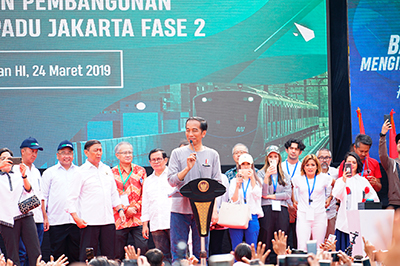 Opening ceremony for Jakarta Mass Rapid Transit (MRT) project (Phase 1), and the groundbreaking ceremony for Phase 2 (March, Indonesia; Photo: JICA)
Opening ceremony for Jakarta Mass Rapid Transit (MRT) project (Phase 1), and the groundbreaking ceremony for Phase 2 (March, Indonesia; Photo: JICA)Japan is also advancing cooperation to support initiatives aimed at strengthening the centrality and unity of ASEAN. In May, Japan signed the Japan-ASEAN Technical Cooperation Agreement, and implemented the project of Training in Cybersecurity for ASEAN countries based on the agreement. Furthermore, in order to meet the massive demand for development funds in the ASEAN region, Prime Minister Abe announced the launch of the Initiative on Overseas Loan and Investment for ASEAN at the Japan-ASEAN Summit Meeting (Thailand) in November. To materialize the initiative, Foreign Minister Motegi announced in December that the initiative aimed at mobilizing 3 billion US dollars from public and private sectors over next three years (2020 to 2022), including through a total of 1.2 billion US dollars overseas loan and investment for ASEAN by JICA in the fields of quality infrastructure development, improving financial access and supporting women, and green investment.
Japan is also actively providing support for capacity building for maritime law enforcement to ASEAN countries positioned along Japan's sea lanes such as the Philippines and Viet Nam, with the aim of building the free and open international order. Such efforts include providing equipment such as patrol vessels and coastal monitoring radars, as well as human resource development through the long-term dispatch of experts. In addition, Japan is providing consistent support to eradicate domestic and regional disparity, and support for the creation of a sustainable society in areas such as disaster risk reduction, environment and climate change, and energy. Japan aims to strengthen Japan-ASEAN cooperation, including through the pursuit of synergies between “Free and Open Indo-Pacific (FOIP)” and the “ASEAN Outlook on the Indo-Pacific (AOIP).”
At the Mekong-Japan Summit Meeting held in November, the leaders confirmed the progress of “Tokyo Strategy 2018,” the guideline for cooperation between Japan and the Mekong region, and adopted the “Mekong-Japan Initiative for SDGs toward 2030.” Under this initiative, Japan announced that it would prioritize the following three areas of cooperation: (i) environmental and urban issues; (ii) sustainable natural resource management and utilization; and, (iii) inclusive growth. Japan has also been working on projects such as the development of Sihanoukville port in Cambodia and the reconstruction of the bridges on the National Road No. 9 in Laos, and will continue to contribute to enhancing connectivity in the Mekong region under “Tokyo Strategy 2018.”
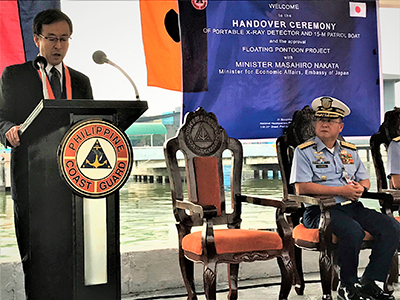
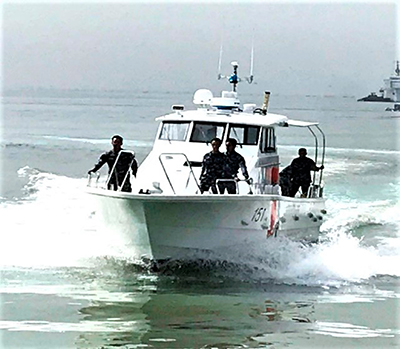 Ceremony for the handing over of 15m-class high-speed boat to the Philippine Coast Guard (November 11, Philippines)
Ceremony for the handing over of 15m-class high-speed boat to the Philippine Coast Guard (November 11, Philippines)(B) Southwest Asia
Southwest Asia holds strategic importance as a marine transportation hub that connects East Asia with the Middle East, and is also a region with immense economic potential, such as India, where economic growth and massive infrastructural demand are anticipated in the future. On the other hand, the region is still faced with by many unresolved issues such as undeveloped infrastructure, poverty, and natural disasters. Japan provides a range of assistance through ODA to assist the region in overcoming these challenges, bearing in mind the improvement of the investment environment for Japanese companies, and ensuring human security.
In recent years, India has been the largest recipient of Japanese yen loans. In addition to providing support for the development of economic and social infrastructure in India, including in the areas of electricity and transportation that contribute to enhancing connectivity and strengthening industrial competitiveness, Japan has also provided support for the realization of sustainable and inclusive growth, such as implementing projects in the forestry sector that serve afforestation and the improvement of livelihoods, as well as projects in the health sector that help improve health and medical services for women and children.
With regard to Bangladesh, Japan is actively offering cooperation under the Bay of Bengal Industrial Growth Belt (BIG-B) initiative,6 in areas such as developing economic infrastructure, strengthening connectivity, and improving the investment environment. A large-scale influx of displaced persons over a short period of time from northern Rakhine State, Myanmar, has resulted in the deterioration of humanitarian situations in camps for displaced persons and has also had a severe impact on the living environment of the surrounding host communities. In response to this situation, Japan provided support through international organizations and NGOs in the areas of water and hygiene, health and medical care, education, and environmental conservation.
With the inauguration of the new Rajapaksa administration in Sri Lanka in November, Foreign Minister Motegi held meetings with the new administration including a foreign ministers' meeting, whereupon he affirmed the strengthening of bilateral relations, and the promotion of cooperation toward the achievement of a “Free and Open Indo-Pacific” in areas such as maritime safety and infrastructural development. In response to the series of terrorist bombings that occurred in Sri Lanka in April, Japan expressed its support for capacity building in the fields of counter-terrorism and security measures, such as the decision to provide counter-terrorism and security equipment under a grant aid programme.
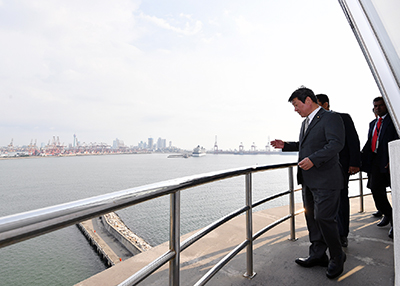 Foreign Minister Motegi inspecting the Port of Colombo in Sri Lanka, which Japan has been providing infrastructural development support for (December 13, Sri Lanka)
Foreign Minister Motegi inspecting the Port of Colombo in Sri Lanka, which Japan has been providing infrastructural development support for (December 13, Sri Lanka)- 6 A vision aimed at cooperation between Japan and Bangladesh with a view to the development of economic infrastructure, improving the investment environment, and enhancing connectivity, focused on the region connecting the capital Dhaka and Chittagong in the south.
(C) Pacific Island Countries (PICs)
In addition to being Japan's neighbors connected by the Pacific, the PICs also share deep historical ties with Japan. Moreover, as these countries possess a vast exclusive economic zone (EEZ, or waters over which a country's economic rights extends), they are a key region for Japan's maritime transportation, and provide vital fishing grounds for Japan's bonito and tuna distant-water fisheries. As such, the stability and prosperity of the PICs are also of great importance to Japan.
The PICs share common issues that are unique to their region, such as smaller economies that are dependent upon primary industries, territories that are scattered over a wide ocean area, difficulty in breaking into the international market, and vulnerability to damages from natural disasters. In light of these circumstances, Japan, as a good partner of the PICs, is providing support to boost their autonomous and sustainable development.
The 8th Pacific Islands Leaders Meeting (PALM8) was held in Iwaki City, Fukushima Prefecture, in May 2018. With the pillars of (i) free, open, and sustainable oceans; (ii) strengthening the foundations for resilient and sustainable development, and (iii) revitalization of people-to-people exchanges, and based on the achievement so far, Japan announced its commitment to continuing robust development assistance as before in keeping with the achievement so far. Japan also announced to further strengthen human resource development and exchanges (5,000 people over a three-year period), which are the foundation for growth and prosperity. The Interagency Committee for the Promotion of Cooperation with Pacific Island Countries determined the basic policy of reinforcing and concentrating resources for the PICs and strengthening initiatives with “All Japan” efforts. Based on the basic policy, Japan is implementing concrete initiatives such as bilateral development assistance on basic infrastructure such as ports and airports as well as technical cooperation targeting multiple countries in areas such as illegal, unreported and unregulated fishing (IUU), disaster risk reduction, waste management that contributes to measures against marine plastic litter, and climate change issues.
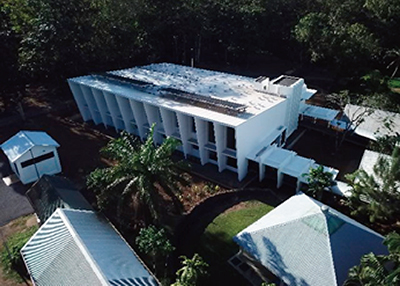 Development of the Pacific Climate Change Center as a hub for work on climate change measures for the Pacific Island Countries (Samoa; Photo: JICA)
Development of the Pacific Climate Change Center as a hub for work on climate change measures for the Pacific Island Countries (Samoa; Photo: JICA)(D) Latin America and the Caribbean
Latin America and the Caribbean is a region with which Japan has enjoyed friendly relations for a long time. The region also has deep historical ties with Japan, as demonstrated by the fact that more than 2 million Japanese descendants, known as “Nikkei,” reside in the region. The region is a major supplier of resources and food, as well as a potential emerging market with gross regional production exceeding 5 trillion US dollars. On the other hand, as many countries in the region are still confronted by problems such as income inequality within country, poverty in rural and mountainous regions, and natural disasters, Japan is engaged in various cooperative efforts while also taking into account the characteristics of each country in the Latin America and the Caribbean.
Specifically, Japan has provided support to Cuba to improve power supply in the Isle of Youth, the country's largest offshore island, and to increase the percentage of renewable energy out of total power generated. It has also provided public buses as a part of efforts to improve public transportation services in the Province of Havana in Cuba. With regard to Honduras, Japan provides made-in-Japan equipment to obtain agricultural water, with a view to securing water resources and developing water storage functions in order to address the increasingly severe droughts caused by prolonged dry seasons.
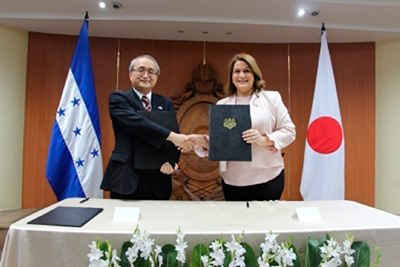 Signing ceremony for the exchange of notes on grant aid aimed at providing assistance for measures against drought (April 3, Honduras)
Signing ceremony for the exchange of notes on grant aid aimed at providing assistance for measures against drought (April 3, Honduras)As for other Caribbean countries, Japan has decided to provide support to the Commonwealth of Dominica through the rehabilitation of fishery buildings that were damaged by hurricanes, as well as the exchange and update of related equipment. In addition, Japan has decided to provide fishery-related equipment and maritime safety equipment under grant aid programmes to Saint Lucia, Antigua and Barbuda, Saint Kitts and Nevis, Grenada and Jamaica. Japan also signed an Exchange of Notes with Haiti in March and November respectively to provide government-controlled rice (approximately 6,000 tons) to the people of Haiti who are in need of food and nutrition as the country continues to be confronted by the serious problem of hunger.
The recent economic and social turmoil in Venezuela has led to an influx of about 4.8 million Venezuelan refugees and migrants into neighboring countries by December. This has in turn contributed to the deterioration of the living environment for residents in the host communities, as well as instability in the region, and response to the issue has not been-sufficient. To support the neighboring countries, Japan, in cooperation with international organizations (the United Nations High Commissioner for Refugees (UNHCR) and the International Organization for Migration (IOM)), has carried out cooperation projects with Brazil and Colombia in June and July respectively to strengthen registration and protection systems. Japan also exchanged notes with Ecuador in November to provide food such as wheat in cooperation with the World Food Programme (WFP).
(E) Central Asia and Caucasus
Central Asia and Caucasus are surrounded by Russia, China, South Asia, the Middle East, and Europe. The stability and development of this region are important for the whole of Eurasia, including Japan. Japan supports the “open, stable, and self-sustained” development of Central Asia and the Caucasus region, and upholds the ideal of Japanese diplomacy that contributes to regional and international peace and stability. Japan supports nation building that allows fundamental values such as human rights, democracy, market economy, and the rule of law to take root for long-term stability and sustainable development in this region, while also taking into account broad-based views covering neighboring regions including Afghanistan and Pakistan.
When Foreign Minister Kono attended the Seventh Foreign Ministers' Meeting of the “Central Asia plus Japan” Dialogue held in Tajikistan in May, he spoke about cooperating in a way that strengthens the resilience of infrastructure and connectivity of the region through a uniquely Japanese approach, such as through human resource development. He also pointed out that from the perspectives of global challenges such as the fight against terrorism and counter-narcotics measures, the stability of Central Asia and Afghanistan is closely linked to the security of the entire international community, and that regional cooperation to address these challenges is indispensable. Based on this recognition, he expressed that the Government of Japan would continue to provide support to Central Asia and Afghanistan in areas such as improving border management.
(F) The Middle East
Securing peace and stability in the Middle East and North Africa regions, which are key geopolitical regions, is crucial not only for the energy security of Japan but also for the stability of the world. From these standpoints, Japan has provided comprehensive support till 2018 at a sum of about 6 billion US dollars to stabilize the Middle East, including human resource development for about 20,000 people, as it announced at the G7 Ise-Shima Summit (2016), with a view to achieving peace and stability in the region. Thereafter, Japan is still continuing to provide support to the Middle East.
With regard to Syria, where civil war has been prolonged, in 2019, Japan provided assistance of approximately 12 million US dollars in support of women and children, who are the most vulnerable in a conflict, as well as support for the health sector. This was used in the East Aleppo region to rehabilitate pediatric hospitals damaged in the conflict, and to bring about the early recovery of community healthcare and medical services in the same region. In December, Japan decided to provide support of 14 million US dollars toward the humanitarian crisis in north-eastern Syria, in the areas of water, hygiene, health, and relief supplies, among others. Furthermore, in order to foster human resources who can contribute to Syria's reconstruction in the future, 79 Syrian students have been accepted in Japan since 2017.
In order to provide support for strengthening the stability of Jordan, which is receiving many Syrian refugees, State Minister for Foreign Affairs Sato Masahisa announced, at the “Jordan Support Conference” held in February, that Japan will be providing support up to a maximum of 730 million US dollars over the next five years, including a development policy loan of 300 million US dollars that was signed in November last year. In July, the two countries signed and exchanged notes on a grant aid for the enhancement of customs security. At the summit meeting between Prime Minister Abe and His Majesty King Abdullah, King of the Hashemite Kingdom of Jordan, in September, the latter expressed his gratitude for the wide range of cooperation that Japan has offered to Jordan to date.
Based on the Corridor for Peace and Prosperity initiative that is implemented through cooperation between Japan, Israel, Palestine, and Jordan with the aim of promoting economic and social development for Palestine, Japan is engaged in efforts to develop the Jericho Agro-Industrial Park (JAIP). At a meeting between Prime Minister Abe and President Abbas of Palestine in October, President Abbas expressed his appreciation for the great support that Japan has given to Palestine.
Human resource development is vital to realize stability in the Middle East in the medium- to long-term. Japan commenced the technical cooperation project, Egypt-Japan University of Science and Technology (E-JUST) Project Phase 3, in Egypt from February, and is providing support for the development of industrial human resources as well as science and technology human resources in Egypt, the Middle East, and the Africa region. At the Japan-Egypt Summit Meeting held in August, President El-Sisi expressed his appreciation for Japan's cooperation to date.
In Yemen, where the crisis is still ongoing, Japan continues to cooperate with international organizations to provide humanitarian support such as food aid. In Afghanistan, to support the reconstruction effort by the government, Japan is providing assistance to encourage the growth of a self-reliant economy and poverty reduction in the country. In 2019, Japan again decided to provide support to Afghanistan in cooperation with international organizations, in areas such as enhancing literacy among adults.
(G) Africa
Africa has been gradually recovering from the economic depression caused by the rapid drop in natural resource prices around 2014, and backed by its abundant natural resources and a rapidly growing population, continues to attract the attention and anticipation of the international community for its potential. Japan has been leading the Tokyo International Conference on African Development (TICAD) process for a quarter of a century since 1993, aiming at further strengthening relations between Japan and Africa. The TICAD process has been highly appraised by African countries.
TICAD7 was held in August, with more than 10,000 participants including 42 state leaders from 53 African countries, 52 development partner countries, and 108 heads of international and regional organizations, as well as representatives from the private sector and civil society such as NGOs.
The adopted outcome document, “Yokohama Declaration 2019,” affirmed priority areas for the realization of Africa's inclusive and sustainable development under the three pillars of TICAD7, Economy, Society, and Peace and Security. Japan will continue to contribute to the growth of Africa through the effective use of ODA, among others, based on the three pillars of TICAD7.
For example, in the pillar of Economy, Japan will expand efforts to foster industrial human resources through the African Business Education Initiative for Youth (ABE initiative) 3.0 and other means, in order to contribute to the promotion of African businesses. The ABE Initiative provides opportunities for youths in Africa to study at graduate schools in Japan and participate in internships in Japanese companies. Since TICAD V (2013), Japan has accepted more than 1,200 trainees through JICA. At TICAD7, Japan announced that it would be fostering 3,000 industrial human resources over a six-year period. Furthermore, with a view to strengthening connectivity, Japan will also promote investment in quality infrastructure with a focus on the three priority regions (East Africa Northern Corridor, Nacala Corridor, and West Africa Growth Ring). For example, in September, the signing and exchange of notes on ODA loans and grant aid took place for the development of the Mombasa region in Kenya, which will contribute to the development of the East Africa Northern Corridor.
In the pillar of Society, Japan will further promote initiatives toward expanding Universal Health Coverage (UHC). It will improve access to primary healthcare and hygiene environment for 3 million people, as well as enable widespread health insurance. For example, technical cooperation projects are being implemented in Ghana (Project for Improving Continuum of Care for Mothers and Children through the introduction of combined MCH Record Book) and Kenya (Partnership for Health Systems Strengthening in Africa (PHSSA) Phase 2). In addition, Japan will provide quality education to 3 million children through measures such as science and mathematics education, and the improvement of the learning environment.
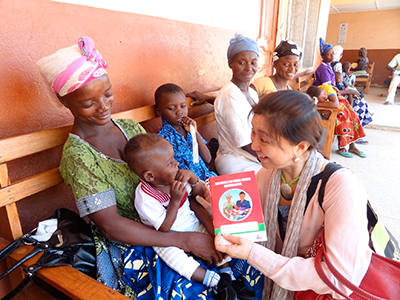 Technical cooperation project in Ghana, “Project for Improving Continuum of Care for Mothers and Children through the introduction of combined MCH Record Book” (2018-2021) (Photo: JICA)
Technical cooperation project in Ghana, “Project for Improving Continuum of Care for Mothers and Children through the introduction of combined MCH Record Book” (2018-2021) (Photo: JICA)In the pillar of Peace and Security, Japan will provide support for institution building and governance strengthening in Africa through human resource development and the provision of security equipment such as border control equipment, under the New Approach for Peace and Stability in Africa (NAPSA) (see Chapter 2, Section 7(1)). In November, Japan decided to provide support in cooperation with the United Nations Office for Project Services (UNOPS), with the goal of facilitating trade in Eastern Africa and building border control capacity.
On October 22, the world was engulfed by grief at the passing of a great leader in the field of international cooperation. Ms. Ogata Sadako had successively held key positions throughout her exceptional career, including the United Nations High Commissioner for Refugees (UNHCR) and President of the Japan International Cooperation Agency (JICA), demonstrating excellent leadership on the frontlines of the fight to resolve global issues such as refugee crisis, poverty, and conflicts.
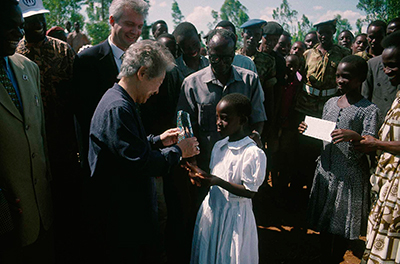 Ms. Ogata, the United Nations High Commissioner for Refugees (UNHCR), visiting a foster home in Burundi (Photo: UNHCR/Paul Stromberg)
Ms. Ogata, the United Nations High Commissioner for Refugees (UNHCR), visiting a foster home in Burundi (Photo: UNHCR/Paul Stromberg)In 1991, she became the first Japanese to be appointed as the High Commissioner of the UNHCR. Throughout her ten-year tenure, she made many historical decisions that became turning points for the agency. A little more than two months after her appointment, a situation arose in which 400,000 Iraqi Kurds were forced to evacuate but were unable to cross the border and became stranded in Iraq. In light of the situation, she took the resolute decision to expand the mandate of UNHCR to extend protection not only to refugees who had crossed the border but also to internally displaced persons.
Ms. Ogata had also been known as the “Five-Foot Giant” for the respect that she inspired through her ability to take actions and her decisiveness in promoting support toward self-reliance through a humanitarian development nexus.
A refugee at the Gihembe Refugee Camp in Rwanda, managed by the UNHCR, named her daughter after Ms. Ogata. In this way, Ms. Ogata still lives on among the people even today.
From 2001, Ms. Ogata took on heavy responsibilities as Japan led the international community in providing assistance to Afghanistan. For example, she served as the co-chair and as Special Representative of the Government of Japan on Reconstruction Assistance at the International Conference on Reconstruction Assistance to Afghanistan held in Tokyo. She also visited Afghanistan many times in person and exerted her best efforts toward building a new nation, such as by setting out Japan's support measures. These measures, known as the “Ogata Initiative,” aim to provide seamless support from humanitarian aid to recovery and reconstruction. Leading figures around the world have expressed their heartfelt respect and profound gratitude to Ms. Ogata at the news of her passing. Among these, many senior government officials from Afghanistan, including former President Karzai and incumbent President Ghani, offered their condolences.
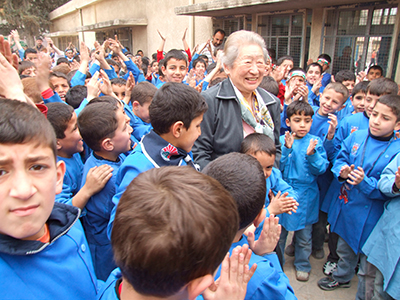 Ms. Ogata, President of JICA, visiting a school at the Palestinian refugee camp in Aleppo, Syria (Photo: JICA)
Ms. Ogata, President of JICA, visiting a school at the Palestinian refugee camp in Aleppo, Syria (Photo: JICA)Thereafter, Ms. Ogata was appointed as the President of JICA in 2003, where she demonstrated her characteristic leadership and built the foundations for present-day JICA, which has grown to be the world's largest bilateral aid agency. Once again, she advocated a hands-on approach to assistance. During her term, she made close to 100 business trips in and out of Japan, and took the lead in putting human security into practice. Her unprecedented stance on human security─to realize freedom from fear and privation through the protection of individuals and empowerment, and for individuals to pursue the right to live with happiness and dignity─has left a deep imprint on the UN and around the world. Ms. Ogata also put effort into supporting peacebuilding and reconstruction, and had worked tirelessly to enable assistance in the immediate aftermath of conflicts in places such as Afghanistan, Iraq, and South Sudan, as it had previously been difficult to include people of such countries in the scope of development projects. Moreover, she also poured her energy into strengthening support for Africa. During her term of office lasting eight and a half years, the percentage of technical cooperation and grant aid provided to Africa increased by approximately three times.
Over the years, Ms. Ogata had made significant contributions to peace, stability, and development in the world. Throughout this time, her strong leadership and decisiveness, as well as her approach of listening to the voices of the people facing difficulties, touched the hearts of many people. Today, the concepts of “human security” and “hands-on approach” that she had developed continue to be passed on not only in Japan, but also widely across the international community as important principles in development assistance and humanitarian aid.
Currently, the number of refugees and internally displaced persons (IDPs) has risen to the highest level since World War II, to approximately 70 million people, and the humanitarian crisis that is arising as a result of conflicts and natural disasters is becoming increasingly complex and prolonged. In cooperation with international organizations, Japan is providing efficient and sustainable assistance to meet the growing needs for humanitarian aid through the development of innovative technology and cooperation with the private sector, including universities and corporations.
Innovative initiative by ICRC: Technological development for landmine and unexploded ordnance disposal
Regis Savioz
Head of Delegation in Japan, International Committee of the Red Cross (ICRC)
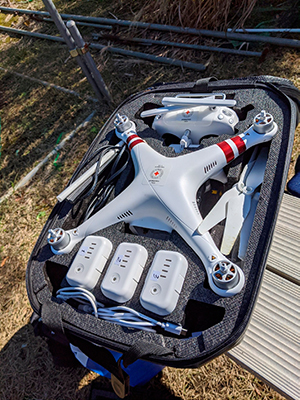 Drone used for demonstration experiment for the acquisition and analysis of thermal images of landmines and unexploded ordnance
Drone used for demonstration experiment for the acquisition and analysis of thermal images of landmines and unexploded ordnanceExplosive remnants such as landmines and unexploded ordnance give rise to casualties among civilians, destroy means of livelihood and services that are indispensable for everyday life, and obstruct the repair of infrastructure and humanitarian aid activities. As such, they continue to have severe humanitarian impacts over several decades after a conflict. The Weapon Contamination Unit of the ICRC has established the goals of providing support to victims, ensuring the safety of ICRC staff, and engaging in existing assistance and protection activities. To that end, it has formulated strategies for the prevention and mitigation of crises caused by explosive remnants and is engaged in related activities.
In November 2018, ICRC concluded a Memorandum of Understanding (MoU) with Waseda University and launched a joint project that aims at developing solutions for the humanitarian sector by using innovative technology. In August 2019, at the TICAD7 conference, Waseda University and ICRC jointly organized a public seminar. Titled “Building a Better World Through Business – Challenges in Humanitarian Assistance in Africa and the Role of Private Sector,” the seminar discussed the projects with the greatest needs as well as the challenges faced in the frontlines of humanitarian aid. Furthermore, in the field of detection and disposal of landmines and unexploded ordnance, experts from the ICRC Weapon Contamination Unit and Waseda University are currently engaged in a research project on the utilization of a thermal image detection system operated from air using a drone. As no innovative solution has yet been found for this field to date, ICRC is conducting testing and verification on the possibility of applying newly developed technologies not only to activities related to the detection and disposal of explosive remnants, but also to a wider range of projects in the humanitarian sector.
In recent years, cooperation with the private sector, with a particular focus on humanitarian aid, has been advancing in various fields. The ICRC delegation in Japan has also been putting effort into academia-industry collaboration in Japan and is anticipating the participation of private-sector corporations in the abovementioned project in the future.
Providing sustainable employment support to the youth through cooperation with private-sector corporations
Sato Mio
Chief of Mission, International Organization for Migration (IOM) Japan
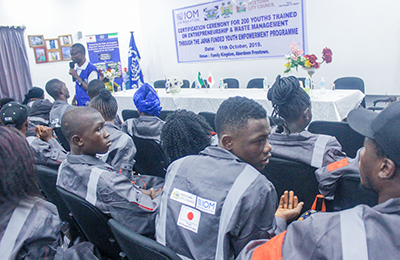 Scene of the completion ceremony for young people who have attended the entrepreneurship training implemented with support from Japan (Sierra Leone)
Scene of the completion ceremony for young people who have attended the entrepreneurship training implemented with support from Japan (Sierra Leone)In recent years, diverse actors with a wide range of experience, knowledge, and skills, have been active on the sites of humanitarian aid to fulfill their respective missions. The International Organization for Migration (IOM), together with its reliable partners, is also engaged in ongoing efforts to deliver support that best meets the needs and situation of each individual site more effectively. In Sierra Leone, where unemployment rates have remained at a high level even after the end of civil war in 2002, IOM, in cooperation with the Government of Japan, is providing various forms of support to young people who are choosing to migrate as irregular workers to other countries, so as to help them gain employment in their own country. As a part of this support, for example, in cooperation with Japanese corporations that operate fruit processing plants (processed fruit is a specialty of Sierra Leone), preparations are underway for the implementation of vocational training that is aligned with the needs of the local job market. By combining, at an appropriate timing, the knowledge that corporations have of the local job environment, with the knowledge that IOM has accumulated through the assistance it has provided to date as well as the information it has obtained about the needs of young people, IOM provides continual support to ensure that vocational training increases the possibility of future employment. By improving the stability of the living environment for young people and their families, we also anticipate the creation of a virtuous cycle for the communities that they live in. At the same time, we aim to contribute to the Sustainable Development Goals (SDGs) by cooperating with local private-sector partners to provide support that realizes a society where no one, including the youth, is left behind.
(4) Approaches to Appropriate and Effective Implementation of ODA
A Approaches to Appropriate Implementation of ODA
In the implementation of ODA, efforts are made to enhance transparency and quality by exchanging views with external experts at each phase and formulating projects based on these discussions. In the phase of preliminary studies in the implementation of ODA, MOFA holds the Development Project Accountability Committee in public, exchanges views with independent committee members that have knowledge of the relevant field, and affirms the validity of the project. Furthermore, JICA publishes ex-post evaluation results for all projects valued at 200 million Japanese yen or more (4,547 projects published as of the end of 2019) on the “ODA Mieru-ka Site” after the implementation of the projects in view of enhancing the transparency of the projects. Ex-post evaluations for projects valued at 1 billion Japanese yen or more are also conducted by third parties. MOFA primarily conducts third-party evaluations at policy level such as country assistance evaluation, thematic evaluation, and aid modality evaluation. With regard to grant aid projects implemented by MOFA, internal ex-post evaluations are carried out for projects over 200 million Japanese yen or more, while third-party ex-post evaluations are conducted for projects over 1 billion Japanese yen or more. Efforts are made to apply the lessons drawn from the results of such ex-post evaluation to the policy formulation and project implementation of future ODA. From the perspective of fulfilling accountability, MOFA also publishes the evaluation reports on MOFA's website.
B Approaches to Effective Implementation of ODA
ODA is implemented through three frameworks corresponding to the needs of the partner country and the scale of the project: grant aid, loan aid, and technical cooperation. In order to utilize the limited budget efficiently and achieve a high level of development, MOFA and JICA take into account the needs of the partner country, draw up a development cooperation policy for each country, and formulate projects while going beyond the boundaries of each framework. For example, while Senegal has begun to formulate a national strategy for achieving Universal Health Coverage (UHC), and to promote the establishment of coverage for medical care (community health insurance and free medical care policy), it faces various technical and financial issues. In light of that, Japan is providing support toward policymaking in the area of UHC and strengthening administrative capacity through technical cooperation. At the same time, it is also providing financial support toward the materialization of the relevant policies by providing policy loans aimed at achieving UHC. Furthermore, comprehensive support is also provided on initiatives by the Senegal Government to achieve UHC, such as efforts to procure medical equipment through grant aid.
C Efforts with regard to International Discussions on ODA
Japan also contributes actively to international discussions on ODA. The OECD/DAC is advancing efforts to modernize ODA, including changing the ODA calculation rules for ODA loans, and efforts to promote the mobilization of private-sector funds. Japan also strives to ensure that ODA is aligned with the modern times, and that efforts by donors are reflected accurately. Japan has also contributed actively to discussions on the humanitarian, development, and peace nexus, as well as ending sexual exploitation, abuse, and harassment in development cooperation and humanitarian assistance.
From 2019 to 2020, Development Co-operation Peer Review for Japan, which is to review policies, systems, budgets, and other elements of Japan's development cooperation by other DAC members, is being conducted for the first time in six years. Through the review process, Japan shares its strengths with other members and aims to contribute to discussions on better approaches to development cooperation.
D Efforts toward Promoting Understanding of ODA
It is vital to have the understanding and support of the people when implementing development cooperation. To that end, efforts are made to promote understanding among the citizens through the effective dissemination of information. In addition to engaging in publicity activities through events that the public participates in, such as Global Festa Japan 2019, Japan's largest international cooperation event held in Odaiba, Tokyo in September, and the One World Festival held in Osaka in February, MOFA is also putting effort into introducing Japan's development cooperation activities around the world in an easy-to-understand manner through the production of the short animation series “Go! ODA-Man” based on the popular anime “Eagle Talon,” and the simulation game “You can be an ODA-Man too!” This short animation series is available to the public through MOFA's YouTube account, and is also broadcast on trains such as JR and Tokyo Metro with the aim of reaching a wide audience. MOFA also dispatches officials to educational institutions and other organizations, and actively conducts “ODA Delivery Lectures” as a part of its efforts to promote understanding of development cooperation.
 Global Festa Japan 2019 (September, Tokyo)
Global Festa Japan 2019 (September, Tokyo)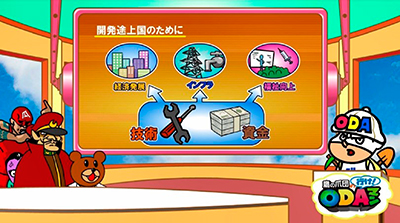 “Save the World Through ODA”: ODA publicity short animation, “Go! ODA-Man” based on the popular anime “Eagle Talon”
“Save the World Through ODA”: ODA publicity short animation, “Go! ODA-Man” based on the popular anime “Eagle Talon”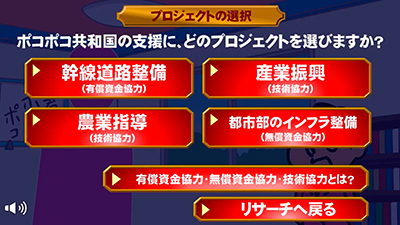 Simulation game “You can be an ODA-Man too!”
Simulation game “You can be an ODA-Man too!”Furthermore, based on the Development Cooperation Charter, which declares enhanced efforts for overseas publicity, MOFA plans tours to its development cooperation project sites for the local media so that they will also cover Japan's cooperation, and issues PR pamphlets and materials in English and local languages.


